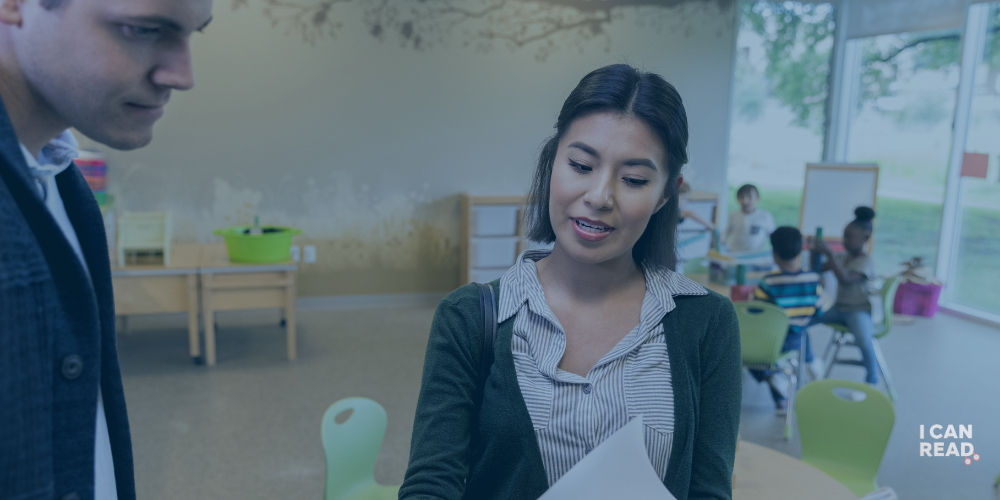by I Can Read Singapore on 28 Feb 2024
Parents and teachers share a common goal –– ensuring the academic success and overall well-being of each child.
However, as both parties strive to nurture a child's reading and writing skills, they often face communication challenges. It’s important to bridge this gap because these skills are the building blocks for everything else they'll learn.
In this article, we’ll share seven tips for better teamwork in helping kids succeed.
1. Establish open channels of communication
Open channels of communication create a supportive environment where both parents and teachers can exchange thoughts, ask questions, and share insights.
This transparency builds trust, fosters a sense of teamwork, and ensures that everyone is working together to help the child develop strong reading and writing skills.
Encourage parents and teachers to use various channels like emails, phone calls, or in-person meetings. Create a welcoming atmosphere where everyone feels valued and listened to.
Schedule regular check-ins to discuss the child's progress, share updates, and address any concerns. By establishing open lines of communication, you're laying the foundation for a collaborative partnership that benefits the child's learning experience.
2. Provide regular updates
Regular updates let both parents and teachers know how how well a child is doing with their reading and writing.
Share updates regularly, whether it's weekly or monthly, depending on what works for everyone involved. This could include progress reports, brief notes, or even quick meetings.
Make it simple and consistent so that it becomes a regular part of the communication routine. This way, both parents and teachers are informed, and there are no surprises. Regular updates build a strong foundation for collaboration, making it easier to address any concerns or celebrate achievements together.
3. Share literacy strategies
By exchanging effective literacy strategies, everyone involved gains valuable insights into what works best for the child. This collaborative approach helps reinforce consistent learning experiences at home and in the classroom, promoting a cohesive and supportive environment for developing strong reading and writing skills.
Parents and teachers can share tips on what activities work especially well for each specific child, and teachers can also advise how to integrate literacy into the child’s daily routines. Create a space, perhaps through newsletters or meetings, where successful strategies can be exchanged.
The key is to create a cooperative mindset where everyone contributes their ideas and experiences to enhance the child's literacy development.
4. Encourage parental involvement
When parents actively participate in their child's learning, it creates a powerful partnership between home and school. This involvement not only reinforces the importance of literacy but also helps tailor approaches to the child's individual needs.
Encourage parents to participate in school activities, literacy events, or parent-teacher meetings. Provide information on how they can extend literacy learning at home through simple activities like reading together, discussing books, or practising writing.
By creating a welcoming atmosphere that invites parents to share their insights and experiences and encourages their involvement, you build a strong foundation for collaboration and ensure the child's success in literacy.
5. Address concerns promptly
Timely attention to concerns allows parents and teachers to collaborate on solutions, preventing issues from becoming more significant obstacles.
It also reassures both parties that they are actively involved in the child's progress, creating a sense of trust and responsiveness in the partnership.
Encourage open communication about concerns, emphasising that it's okay to raise questions or issues. Establish a clear process for addressing concerns, such as setting up regular check-ins or creating a dedicated communication channel for urgent matters.
Actively listen to each other's perspectives and work together to find solutions. The key is to create an environment where both parents and teachers feel comfortable addressing concerns promptly and constructively.
6. Celebrate achievements together
Recognizing and celebrating a child's progress in literacy creates a positive and motivating environment. It reinforces the idea that everyone – parents, teachers, and the child – is part of a supportive team working towards success. Celebrations also boost the child's confidence, making them more enthusiastic about learning and achieving even more.
Acknowledge and celebrate small milestones and improvements in a child's literacy skills. Share positive news, whether it's improved reading fluency or a well-written piece.
Consider creating a recognition system, such as a "Student of the Month" or a literacy-focused bulletin board. By celebrating achievements together, you strengthen the sense of teamwork and commitment to the child's literacy development.
7. Leverage technology
By embracing technology, parents and teachers can stay in sync, ensuring that they are well-informed and can collaborate efficiently to support the child's learning journey.
Explore communication tools that work for everyone involved. This could be through emails, messaging apps, or dedicated platforms for educational updates.
Ensure that everyone is comfortable with the chosen technology. Share important information, progress updates, and even literacy resources through these channels. Set clear guidelines on how and when to use technology for communication, maintaining a balance to avoid overwhelming anyone.
Conclusion
Each child is unique –– their learning journey is a shared responsibility between parents and teachers.
By working together, you create a seamless flow of information, support, and encouragement that guides children toward a future full of literacy and knowledge.

